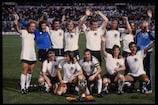Pfaff's journey from caravan to fly-on-the-wall villa
Wednesday, December 4, 2013
Article summary
As Jean-Marie Pfaff turns 60, we reflect on a player who started out in a caravan, won hearts and minds as an outstanding goalkeeper, and was the subject of a reality show.
Article top media content

Article body
Jean-Marie Pfaff is one of Belgian football's most iconic figures. The nation's goalkeeper during their finest hour, he also melted hearts at FC Bayern München and became known as 'El Simpático'. Retirement has not dimmed the spotlight on Pfaff either, with charity work being combined with his lead role in De Pfaffs, a reality television show about his family. It was not always this way: Pfaff's origins, 60 years ago today, could not have been more humble.
"Until I got married I lived in a caravan," he says of his early days in the Flanders town of Lebbeke. "Caravan park people are fantastic. We had a happy life with my brothers and sisters [all 11 of them]. Caravan park people seek contact with others, they are very social. The cosiness, love, friendship, working together, living together, playing a game together and taking care of each other – it was one big happy family."
The death of his father Honoré, a door-to-door carpet salesman, when Jean-Marie was 11, spoiled the perfect picture but the son made a promise: he would become a good goalkeeper. He worked hard. He had a job at the post office and was employed at a weaving mill when, aged 18, he got his break at KSK Beveren. "That was [initially] my hobby, I still had the regular job," he said. "Every day I had to ride my bicycle from Beveren to Sint-Niklaas, come rain or shine." A 25km round trip.
He married Carmen in 1974 and together they ran a sports shop while he established himself as first-choice keeper at Beveren. He was soon immovable, inspiring the club to league and cup success and being named Belgian player of the year in 1978. By then he was his country's No1, following his debut in 1976; he was between the posts at the UEFA European Championship four years later when West Germany's 'Heading Monster' – Horst Hrubesch – barred their path to glory in the final.
In 1982 Pfaff quit Beveren for Bayern, a couple of small steps for spelling but a giant leap in footballing terms. His Bundesliga bow was a disaster. A 1-0 defeat at SV Werder Bremen does not sound too bad but a closer look at the scoreline reveals all: Pfaff own goal. It could only get better and it did, his spectacular saves and idiosyncratic accent making him a fans' favourite. For them he was the new Sepp Maier.
He won three Bundesliga titles with the Bavarians, also losing the 1987 European Champion Clubs' Cup final to FC Porto, yet it was at the 1986 FIFA World Cup that Pfaff gained his place among the game's immortals. He was indomitable, ending Spanish ambitions in a penalty shoot-out in the last eight before running into a Diego Maradona-inspired Argentina. Belgium returned to a heroes' welcome, with 10,000 squeezing into Grote Markt in Brussels to complete the homecoming.
Pfaff returned from Mexico with a new nickname too, 'El Simpático' (Mr Nice Guy) in honour of the smile and wink he regularly flashed. He left Bayern in 1988, winding down his career at K. Lierse SK and Trabzonspor AŞ before hanging up his gloves aged 36. He briefly coached but quickly found a more fitting platform for his garrulous personality with his charity work and as star of De Pfaffs, a reality show that for a decade beamed images from the Pfaff villa in well-to-do Brasschaat, near Antwerp.
If Jean-Marie, Carmen, their three daughters and grandchildren need no introduction to many in Belgium, for most Pfaff's goalkeeping prowess lives longest in the memory. Yet he has not forgotten his humble beginnings. "What I achieved at Bayern, with the Belgian national team, in Mexico, I achieved with effort," he said. "I wanted to improve every time, to be the best." Some would say he was.







